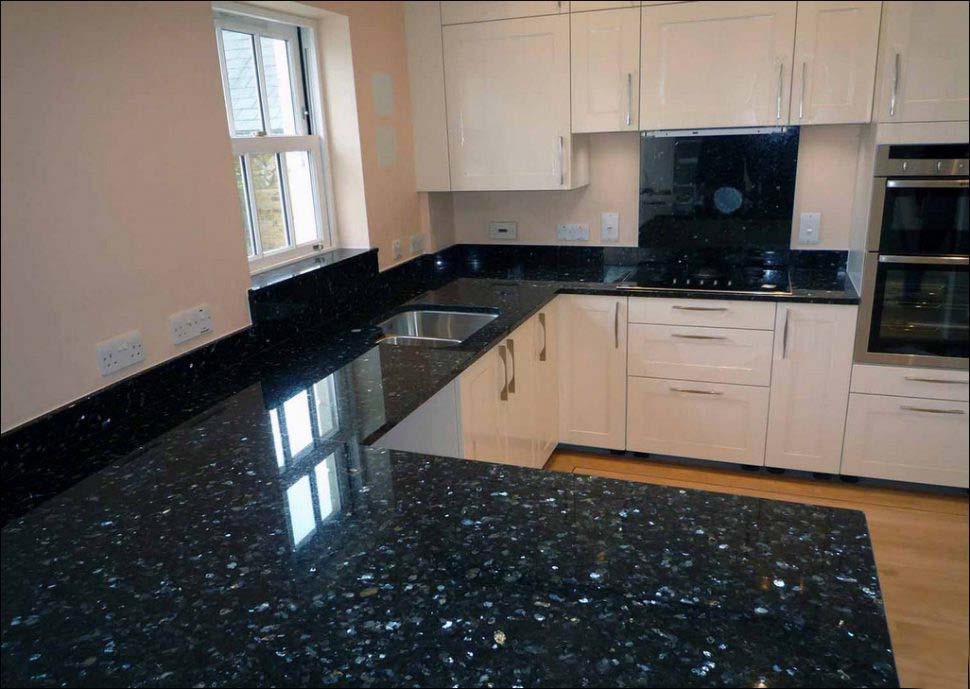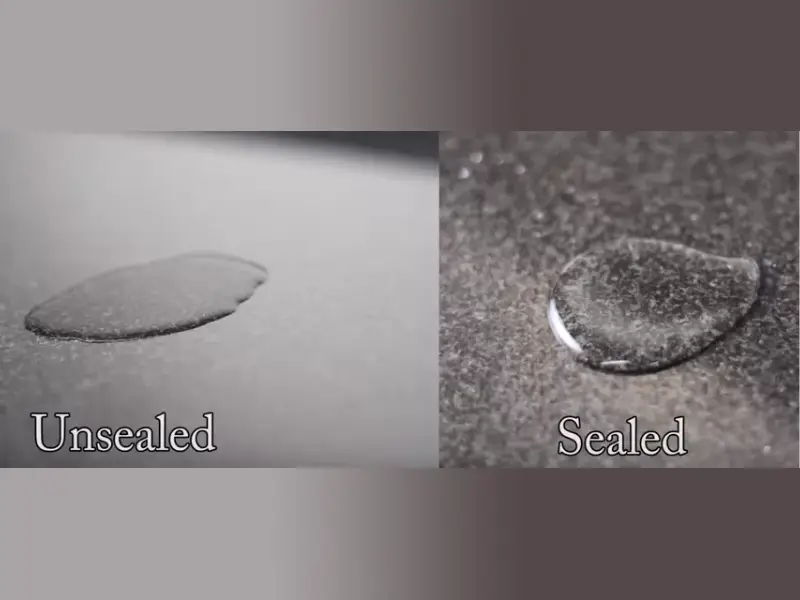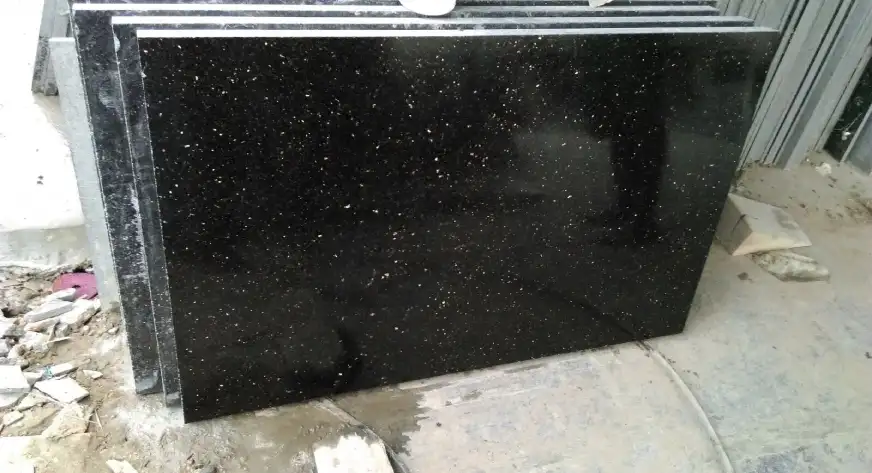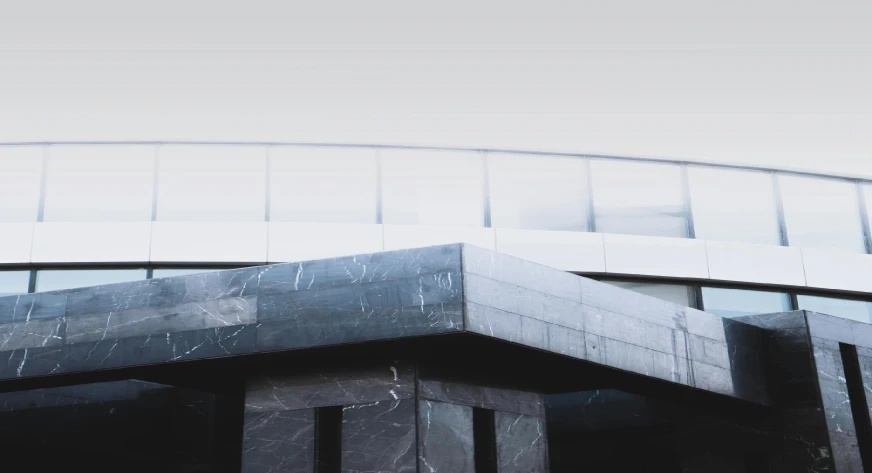Black Galaxy Granite is a stunning natural stone known for its deep black color speckled with golden or silver dots, much like stars in the night sky. This beautiful granite is widely used for kitchen countertops, flooring, and other design projects because it’s both attractive and strong. However, not all Black Galaxy Granite is the same, and understanding its quality is key to making sure your project looks great and lasts a long time. In this article, you will get to know about the quality of black galaxy granite, how to check the quality of black galaxy granite, important tips before buy.
What Makes Black Galaxy Granite Special?
Black Galaxy Granite is mainly found and processed in India, especially in the state of Andhra Pradesh. Geologically, it’s a type of rock called norite, formed a very long time ago. Its unique look comes from tiny crystals of dark plagioclase feldspar and bronzite pyroxene. The bronzite crystals create a copper-colored sparkle when polished, which looks like “sparkling stars in space” and gives the stone its popular name, “Black Galaxy”. Like other granites, it’s mostly made of natural quartz and feldspar.
How to Check the Quality of Black Galaxy Granite?
When looking for Black Galaxy Granite, consider these general quality checks that apply to all granites:
Look Closely for Flaws and Evenness
- High-quality granite should look consistent and be free from visible problems like cracks, chips, or patches.
- Check that the unique speckles and natural patterns are even and harmonious. If the pattern is very uneven or has sudden changes, it might be lower quality.
- Always check the underside of the slab too. Good quality stone will have a similar texture and color on both sides, which means it was properly taken out of the ground and processed.
- Some natural color changes are normal. For projects needing multiple slabs, try to choose them from the same block to ensure they match well.

Looking for flooring ideas? Explore our blog on the best granite designs for floors to elevate your interiors.
Test How Much Water It Absorbs (Porosity Test)
- Porosity refers to tiny holes in the stone that can soak up liquids, which affects its strength and how easy it is to keep clean.
- A simple test is to put a few drops of lemon juice, alcohol, or water on a clean spot of the granite.
- If the liquid soaks in quickly, the granite is more porous and likely lower quality. Ideally, the liquid should stay on the surface or be absorbed very slowly. If the stone gets dark quickly or a damp cloth pressed on it gets wet, it’s highly porous.
- While granite is generally less porous than other stones like sandstone or limestone, it’s still a good idea to seal it, especially in busy areas like kitchens and bathrooms. Sealing helps protect it from stains and wear. Cheaper granite might have more and deeper pits

Check the Thickness
- Thicker granite generally means better quality and more durability.
- For countertops, a common high-quality thickness is around 3 centimeters. Black Galaxy Granite slabs and tiles are often available in 2 cm and 3 cm thicknesses.
- Modern cutting methods have reduced thickness differences to about 1 mm. If there’s a big difference in thickness within one slab, its price will go down.

Consider Where It Comes From and How It’s Made
- Black Galaxy Granite primarily comes from India. Granites from regions like Brazil and India are highly valued because they use good extraction methods and have pure stone deposits, leading to fewer defects and better resistance to damage.
- High-quality stones are carefully polished and sealed, which makes them look better and more resistant to problems. Sealing is very important for granite’s long life and to protect it from stains and liquid damage.
Also Read, Types of Black Granite in 2025
Specific Things to Look For in Black Galaxy Granite
The quality and cost of Black Galaxy Granite are heavily influenced by certain natural features or “problems” it might have
| Category | Type / Issue | Summary | Impact |
| Lines | Black Lines | Thin/thick, common in slabs, vary in direction. | More lines = lower quality & price. |
| White Lines | Visually worse than black lines, affect appearance. | Seen as low quality; not exportable. | |
| Mergeable Lines | Very minor, barely visible on surface. | Acceptable even in premium stones. | |
| Cracks / Fissures | Cracks | Caused by damage or poor handling. | Major defect; middle cracks = unusable. |
| Natural Fissures | Naturally formed, vanish in light/angle. | Not a defect; may enhance beauty. | |
| Galaxy Variation | Speck Variation | Uneven, clustered, or missing golden/silver specks. | High variation = lower quality. |
| Color Variation | Dark or light tone changes in slabs. | Less uniform = lower price. | |
| Processing Issues | Edge Chipping | Due to poor cutting or packing. | Makes edges rough; avoidable with machines. |
| Bending | Slab not flat; visible with ruler. | Reduces usability and quality. | |
| Angle Cutting | Slabs not cut at 90°. | Poor fitting; double-disc machines help. | |
| Polishing | Quality affects shine and strength. | Poor polish = lower appeal. |
Black Galaxy Granite Quality Grades
Black Galaxy Granite is typically divided into four main quality types based on how many and how severe these problems are:
- Fresh/Premium Quality: This is the best quality with the fewest problems. It has medium to large golden dots spread evenly. There are no black lines, white lines, cracks, or big differences in the galaxy pattern, though tiny “mergeable lines” might be present. Premium quality blocks are hard to find, making this the most expensive type. It’s highly recommended for luxury projects like high-end kitchen countertops and fancy hotels.
- Semi/High Commercial/Standard Quality: This quality is commonly exported from India. It’s also somewhat rare and fairly expensive. About 20% of slabs from this quality might have a thin, single black line, and the galaxy specks might be small to medium with slight variation. Crucially, it has no white lines, white spots, major color changes, or cracks. It’s good for kitchen countertops, homes, and industrial floors.
- Commercial Quality: This is a regular quality that is easy to find and cheaper. It often has multiple black lines (about 50% of slabs or one line per slab) and a moderate difference in the galaxy pattern (tiny or small specks). This quality is usually not exported and is mostly used within India. Small black patches and tiny specks are common.
- Super Commercial Quality: This is considered one of the lowest quality types and is generally not suggested for export. It can have many thick black lines, large black patches, white lines, and white spots. Sometimes, there are very few or even no galaxy specks in the black background. Because of all these problems, it is the cheapest and most widely available type.
Also, check out our guide on Absolute Black Granite – Armenia’s Top Choice for Luxury and Durability to see why it’s a popular option for high-end spaces.
Important Tips for Buyers
- Always Inspect Before You Buy: It’s really important to carefully check the material before purchasing Black Galaxy Granite. If your project needs several slabs, choosing them from the same block helps ensure they look consistent. Talking to experts or suppliers can also give you helpful advice.
- Cleaning and Maintenance: Black countertops, especially polished ones, tend to show every streak, smudge, fingerprint, and dust particle. While some find polished black granite easy to clean like glass, others say honed or matte finishes are hard to keep clean and streak-free. Even though granite doesn’t absorb much, sealing can still help black granite resist stains and wear. Ammonia-free Windex or glass cleaner is often suggested for cleaning.
- Watch Out for Fake Stones: Some sellers might try to sell lower quality stones, sometimes even dyed black, as real Black Galaxy or Absolute Black granite. These fake stones might crumble when cut.
- Match to Your Project: The quality of Black Galaxy Granite you choose should fit your project’s needs and your budget. For high-end projects, premium or standard quality is best, while commercial and super commercial types are more suitable for projects with tighter budgets or for local use. Remember, smaller slabs are always cheaper than larger ones.
- Strong and Stain-Resistant: Black Galaxy Granite is a very tough, hard, and dense stone. Similar stones like Absolute Black granite have very low absorption rates and are known for not staining.
Conclusion
Black Galaxy Granite is prized for its beauty and strength, knowing about its quality differences—including lines, galaxy variations, and processing flaws—is essential. By carefully checking the stone, making sure it’s properly sealed, and taking care of it, you can ensure this beautiful natural stone keeps its stunning look and lasts a long time in any setting.
Stone Perfection for Your Every Building Need
From initial ideas to flawless finishes, Lexus Stones supports you with expert knowledge and high-quality materials. Granite, marble, quartz — whatever your project demands.
Contact us now and start building something extraordinary!
GET IN TOUCH
CONTACT US
WhatsApp us


